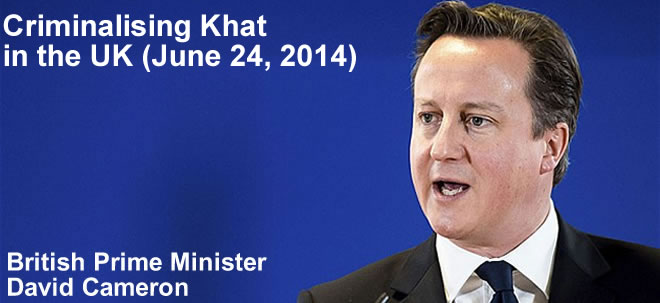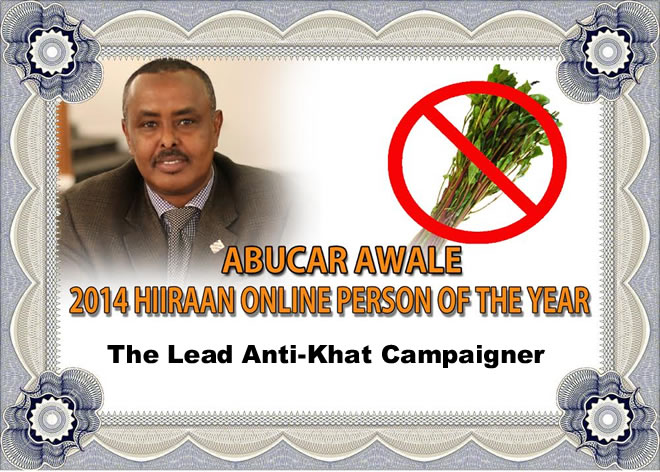

HOL Editorial
Wednesday, December 31, 2014
At this time of great insecurity he sought advice from people in the Merfish who were the gathering places khat chewers. The young men he met there persuaded him to start chewing to relieve his pain and to forget about his worries. However, what started as light relief became a cycle of addiction. Awale began to feel the effects of chewing daily on his personal life. He always woke up late in the afternoon, constantly felt moody and aggressive and was spending his meagre welfare financial support on his addiction. He told HOL in an exclusive interview, “All the problems are reflected in one’s face and when waking up one needs go and chew again.”
Like many other Khat addicts, Abukar very quickly lost his self-esteem and confidence, and as a result of his addiction lost all contact with his family. Abukar described this as the lowest point in his life and he subsequently became depressed and paranoid. He witnessed the success of fellow Somalis attending University and working and he felt extremely ashamed and embarrassed.
Things were not looking promising for Abukar at this point in his life and in 2004, he was a victim of a horrendous assault where he was stabbed four times by a heavy Khat addict. Despite suffering this attack, Abukar tells HOL how thankful he was to the man who nearly killed him.
“It took a knife to put some sense into my head’, says Awale. Doctors told him he was lucky to survive. Covered in blood and chewing Khat at the time, Abukar was thinking what kind of life he was leading and considered where his life was heading. He acknowledged to have hit the lowest point of his life and the knife incident became the defining moment he so desperately needed. Covered in blood and high on khat, Abukar prayed to God to show him the right path considering that, nothing focuses the mind more than the prospect of death in particular where one has recognized that he has achieved very little in his time on earth.
Luckily Abukar’s Prayers were answered and he strived to make changes in his life. With the help of a lawyer, Abukar put pressure on the Home Office and was finally granted status to live and work legally in the UK. After this, he quickly secured employment and started to feel confident as he was earning money and paying his taxes as a respectful member of society.
He was able to fulfil his wish to tell his mother back home in Somalia that he is now succeeding with his life. But Abukar didn’t stop there, he felt morally obliged to support those who were like him became addicted to Khat, thus starting his campaign Stop Khat UK.
He studied Community Development and Leadership at London Metropolitan University in 2004 and learned the essential skills needed to work towards becoming an effective leader and campaign organiser to bring about the ban of Khat in the UK. In 2005, whilst working in a primary school, Abukar would see every morning a lollipop man with a STOP sign and he would visualise an imaginary lollipop sign reading Stop Khat on the UK streets.
Abukar’s campaign began with the setting up of workshops titled ‘Before you chew’ across North West London and aimed to raise awareness of the negative impacts of Khat. Abukar received positive feedback as his sessions were benefiting the community. The campaign received coverage from local newspapers and BBC London which helped to raise the profile of the work he was doing.

Abukar began to challenge the legality of Khat in the UK and met with his local MP and set up a petition to stop it. This petition reached 72,000 signatures by 2009. The Conservative party invited him to parliament and Abukar met with the current Justice Secretary Chris Grayling to discuss banning Khat. He always argued that Khat was a massive barrier to integration and with his personal knowledge of Khat he was able to highlight the Khat’s destructive impacts on health and socio-economic condition of both the user and the wider community. Abukar was questioning the legality of Khat under such circumstances. Through his direct public campaigns, Abukar became a popular figure on Somali television and his reputation within the Somalia communities across the world grew.
Despite the popularity of his anti-khat message, there were still many hurdles on the way to ban it. The British Advisory Council on the Misuse of Drugs (ACMD) published a report showing no evidence of Khat’s social harm. Their reports concluded that negative effects of Khat were not spreading to wider society and that it was a drug, if used responsibly, had limited or no long term health and social impact on users. Abukar challenged this and accused the ACMD of discrimination and ignoring the Somali community’s needs. Many in his community across the world, and especially women in the UK, agreed and campaigned alongside him to lobby the British Home Secretary Teresa May MP to go ahead with the ban on the grounds of its social impact on their community. Abukar’s dream was realised on the 24th June 2014 when Khat officially became a class C drug and its use and sale was banned by law.
After the khat ban, Abukar took the Somali community, mainly Somali mothers, to meet Teresa May MP and celebrate the success. Abukar remembers a moving moment when a young Somali girl whose father was Khat user spoke to Teresa May and said “Thank you very much, I hope I will spend time with my dad from now on.”
Abukar’s future ambition is to return to Somalia to continue his campaign. He endeavours for his Qaad-Diid Foundation' to put pressure on policy makers to develop health regulations around Khat.
"The amount of money Somalis spend on Khat is more than the Somali Government annual budget. People are being traumatized by the prolonged civil war, there is the need to stand up against such waste" In Somalia Khat is cheap to buy and young children as old as eight become users. Abukar is determined to stop hard currency flying to Kenya and Ethiopia for the Khat’s import.. Abukar’s ‘Qaad Diid Foundation’ will working towards raising awareness and is committed to ban Khat in Somalia. He is well aware that this is a long and difficult road and not risk free. Abukar has already received death threats as a result of his work in the UK but he is resilient and committed. Abukar strongly believes that God has purpose for each person and his inspirational message to his community is that united we can make difference to ban Khat.
For his mobilisation of his community in the UK and for being the face of the successful Khat-Ban campaign in the UK over the last few years, Abukar Awale is HOL Person of the year.
The selection process of HOL person of the year is undertaken by HOL writers, contributors, and editorial board and it is based on certain criteria, including being a Somali citizen and having contributed positively to the well-being of the Somali people.
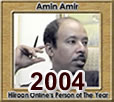 |
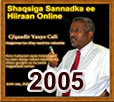 |
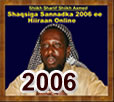 |
 |
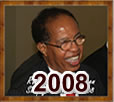 |
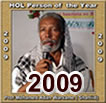 |
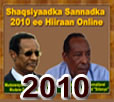 |
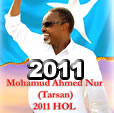 |
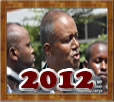 |
 |
